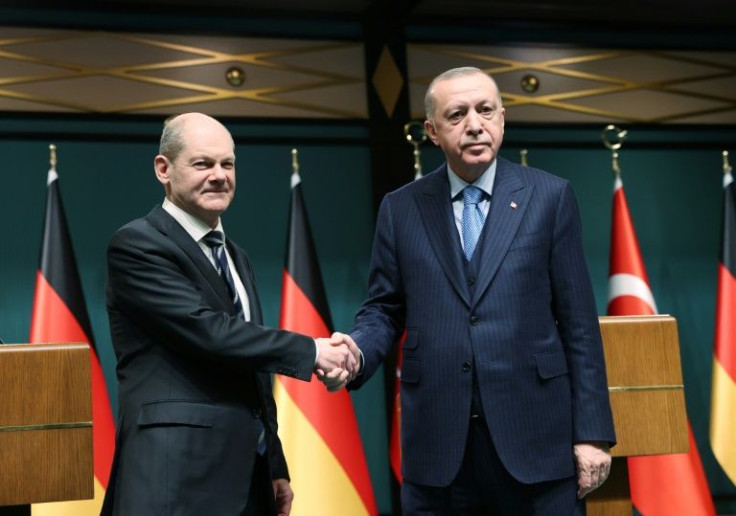Germany, Turkey Call For Immediate Ceasefire In Ukraine
NATO allies Turkey and Germany on Monday appealed for a ceasefire between Russia and Ukraine to open humanitarian corridors for civilian evacuations.
German Chancellor Olaf Scholz met in the Turkish capital Ankara with President Recep Tayyip Erdogan, who hopes to facilitate a solution via direct talks with Moscow.
The meeting was the first between the leaders since Scholz replaced Angela Merkel, with whom Erdogan forged a special relationship.
"We are in agreement on the issue of reaching a ceasefire as soon as possible," Scholz told a joint news conference after the meeting, in comments translated into Turkish.
"It must be ensured that necessary corridors are open for the evacuation of civilians."
Erdogan said Turkey and Germany shared "common views and concerns" over Russia's attack on its pro-Western neighbour.
"We will continue our relentless efforts for a long-lasting ceasefire," he said.
Ankara is playing a mediating role and has direct links to the two warring sides.
Turkey is a traditional ally of Kyiv and supplied the war-hit country with drones but relies heavily on Russia for gas imports and tourist revenue.
Erdogan has called Moscow's attacks on Ukraine "unacceptable" but shied away from Western sanctions targeting the Russian economy.
"We need to preserve our friendship with (Volodymyr) Zelensky and (Vladimir) Putin," Erdogan said, referring to the Russian and Ukrainian leaders.
For his part, the German chancellor visited Moscow before the start of hostilities and has spoken several times to Russian President Putin, while providing Ukraine with arms.
Last Thursday, Turkey hosted the first talks between the Russian and Ukrainian foreign ministers since the invasion of Ukraine began on February 24.
Scholz praised Ankara's efforts for a diplomatic solution as "positive" and "very useful".

"The guns must be silenced as soon as possible," he said, urging Putin "to stop" Russia's attacks on Kyiv.
For Guenter Seufert, researcher at the German Institute for International and Security Affairs, Scholz's visit aims to keep Ankara on side.
"Nobody is demanding Turkey to comply with the Western sanctions but Turkey should not try to open extra channels to curve around sanctions," he told AFP.
The Europeans, according to Seufert, are carefully monitoring Scholz's visit, which comes as Ankara seeks to mend fences with its regional rivals.
Israeli President Isaac Herzog visited last week and Greek Prime Minister Kyriakos Mitsotakis followed on Sunday.
Scholz welcomed Ankara's "positive" opening up to the region but raised Berlin's concerns over the situation of human rights and rule of law under Erdogan's two-decade rule.
"We believe these (problems) will be resolved as soon as possible," he said.
Turkey's arrest of German citizens including journalists over suspected ties with Kurdish militants or a network led by US-based Muslim cleric Fethullah Gulen sparked a crisis in ties with Germany.
Human rights advocates say Turkey is ranked among the world's top jailers of journalists, while the government says nobody is jailed because of its professional work.
Scholz said it would be "unfair" to claim former chancellor Merkel ignored human rights violations in Turkey at the expense of securing a migrant deal with Ankara to keep Syrians inside Turkish territory.
He said he raised in talks with Erdogan the case of Deutsche Welle's website -- which refused to apply for a broadcast licence from Turkey's media watchdog over censorship concerns.
Erdogan said the latest developments provided Turkey with a "key role" in European security and hoped Germany, an EU heavyweight, would continue its "constructive support" in improving Ankara's ties with Brussels.
© Copyright AFP 2024. All rights reserved.





















